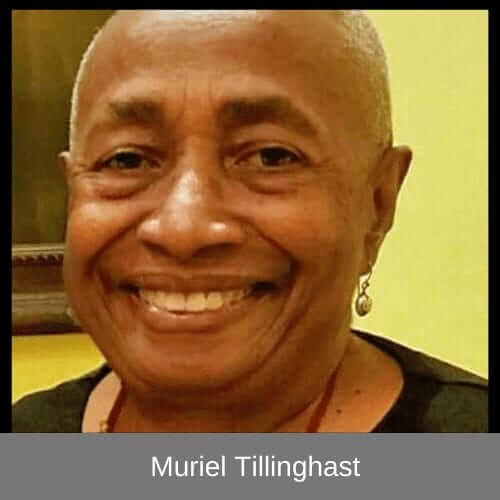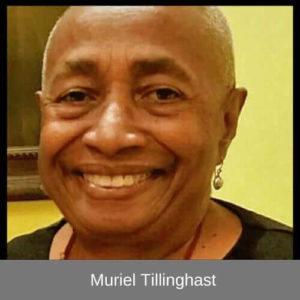
Muriel Tillinghast Ep. 143 - Meet Muriel Tillinghast, a human rights activist from the 1960s to today! She takes us on a long but fascinating journey from the initial civil rights activities in the 1960s through an extensive career in revenue generation and oversight to mediation and negotiation to educational teaching and administration. She describes her experiences in NAG and SNCC in both desegregation and tenant rights. She tells us about her advocacy work in AIDs, immigration, medical experimentation, murder/false accusation, alternative sentencing, prison reform, and housing issues. She was even a Green Party candidate for Vice-President in 1996! This woman has LIVED it!
Top Takeaways:
-
- Understanding that not everyone who doesn't look like you is the enemy or the problem
- Why the US needs to grow and recognize the difference between freedom and morality
- How voter fraud and black face were conducted for some people to keep holding on to power over others
- Learning how to stand up for yourself as a black person without fear when faced by lethal racist beasts
- The importance of taking action towards structural change by pinpointing certain things you don't like and focusing on them
Listen in to learn the major historical experiences that Muriel has lived through and how she and others had to fight for their place as African-Americans.
"The Movement continues in every aspect of life. I have carried my understanding of its principles into the classroom, to work, into prisons and jails and in my daily walk through life. It is a vital to me as the air I breathe." - Muriel Tillinghast
Her involvement in civil rights started in junior high school as a youth organizer for the Maryland Synod Luther League. In college, she was president of the Non-Violent Action Group (NAG) and participated in de-segregation issues in Washington, D.C., Maryland and Delaware. She worked behind-the-scenes in the March on Washington. This experience allowed her to become a key organizer for the Student Nonviolent Action Committee. Listen to her experience as she held down state operations during the Mississippi Challenge, Greenwood, MS, in late summer-fall, 1964 as one of three women organizers. She not only headed State operations in Jackson, MS but also worked with Cleve Sellers, head of SNCC Personnel and Ruby Doris Smith Robinson, head of SNCC Operations, 1965-1967 with Office operations for the up-south program of Mississippians coming to Washington, D.C. to voice their opinion and to raise a public cry against the war in Vietnam, summer 1966.
Kent Watkins, founder and head of the American Academy for Housing and Communities, describes his experience in first meeting her. "Muriel's path and mine actually crossed without knowing it, when she was sleeping in the basement of the All Soul's Unitarian church on the way to Mississippi for SNCC (Student's Non-Violent Coordinating Committee) and I was attending that church, while working as a staffer on both the House and then Senate side for the Civil Rights Act of 1964 and Voting Rights Act of 1965. The difference was that Muriel was what made it all happen by being on the front lines with others who risked their lives, while I sat in gilded offices in the Capitol and worked on legislation. She has some wonderful but searing stories to tell about this era of justice and afterwards, she moved on to make further contributions to civil society, all of which qualified her as an Academy Fellow Trailblazer."
In her adult life, she has held positions with major responsibilities in high impact planning and delivery operations, strategic support, advocacy, education, family, and child services.
Feel like you are walking beside her through it all! And she hasn't changed a bit.
In this episode you'll discover:
Muriel explains how her observation skills helped her see situations deeply, how her family got her involved with organizations, plus her historical experiences [5:10]
She describes what led to her move from Washington DC to Mississippi, and the life experiences of Mississippi as a black person [18:59]
She talks about the strategic reasons why the Counsel of Federated Organizations umbrella was formed in the South and how it taught her to listen and be respectful [33:42]
Muriel explains what the Student Nonviolence Coordinated Committee (SNCC) was and what they did [43:43]
She narrates stories of how several people were negatively impacted by the movement due to poor conditions and war [53:53]
How she stood up to a man who pulled a gun on her face for no good reason and other incidents where she had to stand up for herself [58:52]
Why the Black Lives Matter movement needs to be organized better and differently [1:03:09]
Muriel advises young people to stop talking and instead take action towards structural change [1:14:19]
Relevant Links:
Pondering War with Muriel Tillinghast
Podcasts Like This:

